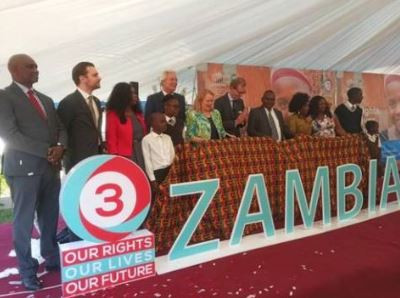
GCED Basic Search Form
Quick Search
You are here
News

UNESCO, Swedish International Development Cooperation Agency (Sida) and Zambia’s Ministries of Higher and General Education signed a cooperation agreement to launch the “Our Rights, Our Lives, Our Future” (O3) project for Zambia on 20th March 2019 in Lusaka.
“We are not signing just another project,” said UNESCO Regional Director for Southern Africa, Prof. Hubert Gijzen.
“We are signing up for the Zambia component of a regional flagship programme. We are signing up to a partnership; we are signing up for a fight — a fight against HIV, Early and Unintended Pregnancy (EUP), and Gender-Based Violence (GBV); a fight for adolescents and young people and particularly for young women and girls. We are signing up to hope and commitment to end AIDS as a public health threat by 2030,” he added.
The O3 project seeks to improve sexual and reproductive health, gender, and education outcomes for adolescents and young people in sub-Saharan Africa through sustained reductions in new HIV and other sexually transmitted infections, early and unintended pregnancy, and Gender-Based Violence.
It comes as a successor to the recently-completed national project on “Strengthening Comprehensive Sexuality Education (CSE) Programmes for Young People in School Settings in Zambia” which UNESCO had been supporting through Zambia’s Ministry of General Education to implement CSE in national schools. This earlier project aimed to strengthen the delivery of CSE targeting 10 – 24 year-olds (including Young People Living with HIV (YPLHIV) and young people with disabilities) in Zambia through increasing access to high-quality and age-appropriate sexuality education and health services.
The Permanent Secretary for the Ministry of Higher Education Mr Mabvuto Sakala, who also represented the Permanent Secretary for the Ministry of General Education Dr. Jobbicks Kalumba at the ceremony, said the Government is aware that the country continues to face considerable challenges around Sexual and Reproductive Health and Rights (SRHR) and the well-being of young people. He further stated that the Government was grateful for the generous support of the Swedish Government and UNESCO in the implementation of CSE, assuring that Zambia remains committed to and will continue implementing CSE in schools in order to achieve better sexual and reproductive health outcomes among its adolescents and young people.
Sweden’s Permanent Secretary for International Development Cooperation Mr. Per Olsson Fridh also reaffirmed Sweden’s commitment to supporting CSE programmes stating that the O3 project will aim to reach 100% of grade 5-12 learners in primary and secondary schools in Zambia by 2023 through strengthened life skills-based HIV and sexuality education curricula. In addition, the project is expected to reach and build the capacity of practicing teachers, including guidance and counseling teachers, through in-service training modalities to deliver CSE at classroom level.
Speaking at the same occasion, UN Resident Coordinator, Ms. Janet Rogan said young people are not only the future but the present as well. She added that improving their healthiness will enable them to make full contribution to the development of Zambia and Africa as whole.
The O3 project is in line with Zambia’s National General Education Policy; UNESCO strategy on education for health and well-being; the 2016-2021 UNAIDS Fast-Track Strategy (specifically result areas 3 and 5); the Swedish International Development Cooperation Agency Strategy for Sexual and Reproductive Health and Rights (SRHR) in sub-Saharan Africa (2015-2021); and the 2016 Political Declaration on HIV and AIDS. The project has been conceptualized in alignment with the country’s thematic focus on creating a resilient, diversified economy for sustained advanced growth and social economic development as articulated in the 7th National Development Plan (2017-2021).
For more information, please contact: a.mwewa-saili@unesco.org.
URL:
